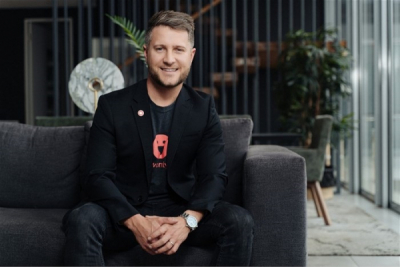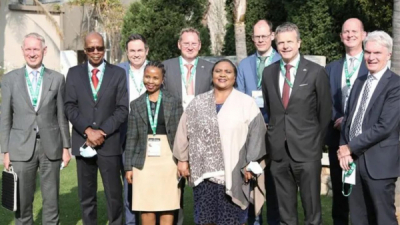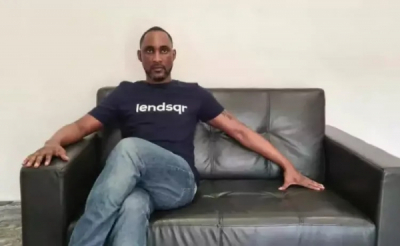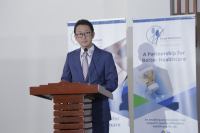In five years, the African gaming community has recorded outstanding growth. The industry now appears like a strong job and wealth creation catalyst on the continent.
Goethe Games Station -a gaming tour- was launched in Burkina Faso last May 7. Organized by Goethe-Institut Ouagadougou and Enter Africa, a creative African organization initiated by 15 Goethe-Institutes, it aims to teach “young people about the ins and outs of digital and virtual reality.”
Over seven months, in the framework of Goethe Games Station, a caravan will be organized at selected popular places in Ouagadougou on the first weekend of every month. During the events, the national gaming community will be introduced to the youth.
For Evelia Gadegbeku, president of Enter Africa, the project is aimed at giving the “Burkinabe youth the opportunity to discover gaming, the opportunities it offers, and its career paths.”
The caravan will also educate participants on how to make good use of digital technologies and avoid the dangers of gaming addiction, notably social division and aggressive behaviors.
Last year, a Newzoo report revealed that of the 1.14 billion residents in Sub-Saharan Africa, 186 million (16% of the overall population) were video game players. 95% of the game players (177 million) play mobile games. According to the report, with an annual growth rate estimated at 9.2% yearly between 2020 and 2024, the region has the fastest-growing mobile gaming community in the world.
Also, 34% (63 million) of Sub-Sarahan African gamers pay for games. Sub-Saharan African gamers are also expected to be the fastest-rising in the world.
According to Newzoo, the gaming industry generated US$590 million in 2021, with promising growth prospects. With democratization actions, Burkinabe youth can capture part of those revenues in the same way South Africans, Nigerians, Ghanaians, Kenyans, and Ethiopians are already doing.
Muriel Edjo
In Africa, healthcare access remains a major challenge despite the numerous e-health solutions being developed. The issue is mainly caused by financial problems. The low-cost insurance policy being developed by the two partners aims to address that situation.
Kenyan fintech Power Financial Wellness (PFW) recently announced a partnership with insurtech Turaco. According to a release dated April 26, the partnership aims to offer low-cost insurance -as low as US$2 monthly subscriptions- to African gig and salaried workers.
“Power is dedicated to providing a marketplace of financial services to working individuals across Africa. With Turaco, we now have a partner that helps digitize tailor-made insurance offerings. With Power’s ability to finance premiums and collect from workers, this partnership will help scale the delivery of affordable insurance to working individuals in Kenya and beyond,” commented PFW CEO Brian Dempsey.
PFW clients can subscribe to the insurance policies once Turaco’s API is integrated into the fintech’s digital platforms. PFW offers payment and loan services (insurance services will soon start with the API integration). As for Turaco, it offers low-cost claim settlement packages in Uganda, Kenya, Nigeria, and the United States of America.
In addition to health insurance, PFW clients have access to other insurtech products. These include credit life insurance, disability, theft, and a comprehensive range of inpatient and outpatient insurance.
Some African countries have a national health insurance scheme but only a small portion of the population is covered. According to the World Health Organization, while 91% of the population in Rwanda is covered by the national health insurance scheme, 33% is covered in Ghana and only 3% in Nigeria
Adoni Conrad Quenum
Over the past ten years, François de Wet has sharpened his expertise through various professional experiences. With his online Wamly, he extended his reach to a wider range of business leaders who are intent on surrounding themselves with qualified staff.
François de Wet (photo) is a South African registered Industrial and organizational (I/O) psychologist. In 2018, he founded Wamly, the startup which developed an eponymous one-way interview software to ease recruitment processes.
With Wamly, firms can organize many interviews at the same time without mobilizing personnel. All they have to do is to create interview questions and send them to multiple applicants who will record a video of themselves answering the interview questions. That video is then sent to the interview panel, which will review it whenever they want.
According to François de Wet, “companies run because of people. People are the most valuable piece of the puzzle in any business.” So, “it should make sense that we place a high value on the process that we are using to find and retain these people,” he adds.
Wamly is the result of years of experience accumulated in human resources consulting by its founder. As a trained industrial and organizational psychologist, he knows quite well how to make firms more efficient.
In 2012, he graduated from North-West University, Potchefstroom, with a Bachelor of Commerce in Industrial and organizational psychology. Months before his graduation, he “completed vacation work as a vocational consultant at EXXARO HQ, a human resources consultancy firm in Pretoria.
He later joined another human resource consultancy firm, Top Talent Solutions, where he spent over five years in various positions.
In 2018, he left Top Talent Solutions to create the talent intelligence platformTalent Insights and Wamly. The one-way interview platform is now used by large firms to save time.
The next stage for Wamly is to enter additional African markets and ultimately export the solution out of continental borders. For that purpose, in January 2022, the startup raised a series B financing of an undisclosed amount from Knife Capital.
Melchior Koba
The digitalization of trade processes helps avoid administrative delays. By rolling out the electronic phytosanitary certification platform, South Africa wants to reduce fraud and save time.
The South African Ministry of Agriculture presented its online phytosanitary certification system last May 9. It thus became the second African country to introduce such a certification system after Morocco (in 2020).
The platform accelerates the issuance of phytosanitary documents, which are necessary for the exportation of farm products. It also guarantees the credibility of the inspections carried out by the national plant protection organization NNPOZA while boosting the trust of foreign partners’ certification agencies, notably in European markets that have adopted the e-phytosanitary system.
According to a media advisory published by the Ministry on May 8, with the e-certification system, phytosanitary applications are fully managed online, the responses are automatic upon completion of the application. Also, applicants can track the status of their applications. The system reduces “fraudulent activities related to phytosanitary certificates,” the media advisory explains.
Once approved the certificate is issued and sent directly to the requester’s email. The latter can share it directly with trading partners who will, in turn, send it to the national plant protection agencies in exporting countries. The authenticity of those certificates can be verified via the International Plant Protection Convention (IPPC)’s platform. Therefore, South African exporters will no longer face suspensions about the quality of their products. The issue used to delay the entrance of their products into destination countries because of the additional inspections required.
South Africa’s phytosanitary e-certification system is the result of a collaboration between the local government and the Netherlands. The process started in November 2019, with the dematerialization of phytosanitary procedures for grape exporters. Months later, in April 2020, citruses and other plant products were added to the list of farm products whose phytosanitary certificates can be requested online. In April 2021, the whole procedure was dematerialized.
“We are delighted to have reached this milestone within a short time and we also owe the existence of this system to our industry. We had extensive stakeholder consultations and ensured that there was awareness created and therefore a better opportunity to implement the painful process of change management with ease,” said Minister of Agriculture Thokozile Didiza.
For the government official, the next step will be to “further collaborate with the Netherlands on the boarding of animal products for exports and the imports of plants, animals and their products.”
“In line with our commitment towards achieving the ideals of agenda 2063 of the African Union, South Africa commits to extending our experiences to assist fellow African countries to also join and have e-certification systems. (...) This will also help us to broaden trade through the Africa Continental Free Trade Area, especially its annexure on sanitary and phytosanitary measures,” Didiza added.
Muriel Edjo
SeamlesHR is positively impacting Nigerian firms’ performance since its creation in 2018. It boosts their efficiency by streamlining their human resources management process.
Emmanuel Okeleji (photo) is a Nigerian investment banker, medical doctor, and serial entrepreneur. Through SeamlessHR, the startup he co-founded in 2018 with Deji Lana, he helps firms streamline their human resources and payroll management processes.
With its eponymous cloud platform, SeamlessHR allows firms to track applications, onboard employees, track performances and attendance, manage payroll, leave and skill development. In short, the cloud platform saves firms precious time. For instance, the firms can administer recruitment tests and carry out interviews remotely. So, there is no need for applicants and recruiters to be physically present for tests.
The core modules of the platform include Tracking System (ATS), Employee Onboarding, Payroll, Leave Management, Performance Management, Talent Management, Succession & Workforce Planning, Time & Attendance Management, and Learning & Development.
As a trained medical doctor, Mr. Emmanuel graduated from Obafemi Awolowo University, Osun State, Nigeria, in 2011. Three years into his medical studies, in 2007, he co-funded Waressence, a software development firm. Six years later, in 2013, he also co-founded Insidify.com, a Nigeran job aggregator.
Apart from his entrepreneurship career, Emmanuel Okeleji also has an extensive professional career. In 2011, he worked in the Investment Banking Division and Securities Division of UK investment banker Goldman Sachs. The following year, he joined the staff of St.Nicholas Hospital, Lagos, as a resident physician.
With his entrepreneurship experience, Emmanuel Okeleji has gained credibility nationwide. Last year, he was invited to the fifth annual lecture of the Kings University, Osun State, to speak on entrepreneurship, innovation, and employment.
His current plan is to continue to improve human resources management and SeamlessHR clients’ experience by adding new features to the cloud platform. For that purpose, in January 2022, the startup raised US$10 million in a Series A round led by TLcom Capital. Participating firms were Capria Ventures, Lateral Frontier Ventures, Enza Capital, and Ingressive Capital.
Melchior Koba
In Africa, most firms and individuals face credit challenges because traditional banks are more inclined on lending funds to governments, large firms, and high net-worth individuals. In Nigeria, Lendsqr wants to address that issue by decentralizing credit access for individuals.
In Nigeria, fintech startup Lendsqr wants to solve credit problems. With its eponymous cloud platform, the startup founded in 2018 by Adedeji Olowe (photo) facilitates loans to small firms and middle-class individuals.
“At Lendsqr, we’re on a mission to simplify the lending process with an easy, but sophisticated technology that can guarantee an awesome lending experience. We strongly believe that our technology will solve the credit gap in developing countries and improve the lives of millions,” the startup promises.
With its cloud platform, it automates the loan process, allowing lenders to personalize, manage and optimize their offers. To access its services, borrowers must register and confirm their identities using official documents.
Lendsqr is currently more focused on small firms. Its ambition is to help them get access to the credit they need for their development. It has no mobile apps but, it is accessible through a USSD code that allows users, those living in remote areas notably, to easily request loans. In March 2022, the startup raised US$1 million to support its growth.
Adoni Conrad Quenum
In the past five years, Africa’s startup ecosystem has grown rapidly and several unicorns were created. With new opportunities still open, the continent is sparking investors’ growing interest.
Japanese investment fund AAIC Investment announced Tuesday (April 29), the formation of the Africa Innovation & Healthcare Fund VCC (AHF2); its second investment fund dedicated to African startups. Supported by Asahi Intecc Co., Ltd., Eisai Inc., Ohara Pharmaceuticals, and major Japanese trading firms, the fund will support healthtech startups over the next ten years.
Currently, it is still open for subscriptions and will remain open until its closing at US$150 million.
According to Hiroki Ishida (photo), AAIC Investment’s Principal and Representative of the Kenya office, “the fact that hospitals in Africa are still lacking in basic infrastructure highlights the greater importance of the role of technology in developing countries than in developed economies.”
“I am looking forward to the next ten years of development, which is also the period of operation for our second fund,” he added.
AAIC Investment launched its first Africa Healthcare Fund in 2017. Through the fund, it raised US$47 million, which was invested in 30 startups. One of those startups is Chipper Cash, a cross-border payment provider which became a unicorn in 2021. That year, the startup raised US$150 million in Series C funding, raising its valuation to US$2 billion.
AAIC Investment already has offices in Kenya (2015), Nigeria (December 2020), and South Africa (March 2022). With AHF2, it plans to expand its operational footprint by covering the whole of Africa.
In the past five years, Africa’s startup ecosystem has grown rapidly. The growth was recently accelerated by the coronavirus pandemic, which highlighted the importance of digital solutions on the continent. Nigeria, Kenya, South Africa, and Egypt have attracted a sizeable amount of investment due to their innovation-enabling ecosystems. According to Partech, those countries captured close to 74% of the overall investments attracted by African startups in 2021.
Muriel Edjo
For several months, the social distancing measures issued to curb the spread of the coronavirus pandemic forced a shift in professional and social exchanges. That period saw significant growth in social media use. It was also the opportunity for platforms to get an accurate feel of users’ needs and try to solve them. With the current upgrades and more to come, Whatsapp is responding to users’ suggestions.
Messenger platform Whatsapp announced Thursday (April 5) new improvements to its platform; 512 people can now be added to Whatsapp groups, twice the number that was previously allowed. In addition, from 100MB previously, the max size of files users can send through end-to-end encryption is increased to 2GB.
In Africa, WhatsApp's latest upgrades are opportune for several players, including online businesses, educational institutions, professional groups, trade unions, NGOs, and political parties.
In its blog post announcing the upgrades, WhatsApp explained that they are in line with its vision to enable “organizations, businesses, and other close-knit groups to communicate securely and get things done.”
This year, it made significant improvements to its platform to make it more useful. In March, the messenger platform introduced new voice message options. For instance, users can listen to voice messages out of the chat where they were sent. That way, they can multitask and reply to other chats. They can also pause the voice messages they are recording or listen to them before sending.
In April, the "Community" feature was introduced to “bring together separate groups under one umbrella.”
The platform is also developing several features to take into account the suggestions made by its users during the Coronavirus pandemic that had a notable impact on social and professional exchanges.
Muriel Edjo
Based on three factors, StartupBlink ranked the top 100 countries that had a conducive ecosystem for startup development in 2021. Three African countries have joined the top 100, and all of them are located in West Africa.
In 2021, the number of African countries in the best 100 countries for startups rose to 14, up from 11 in 2020. The ranking was presented in the Global Startup Ecosystem Index 2021 published by StartupBlink.
Though minimal, the progress demonstrates a certain dynamism in the investments made by African countries to offer the youth an appropriate innovative entrepreneurial framework. In Africa, most countries are aware that startups are important players they can rely on to improve residents’ access to various services and curb unemployment.
In the 2021 ranking, there were no Central African countries. East Africa was represented by six countries (up from four in 2020) against three countries for North Africa.
Southern Africa was represented by two countries, including South Africa which won a spot in the best 50 countries for startups. The region that achieved the most notable progress is West Africa with three countries (Nigeria, Ghana, and Cape Verde), which were absent from the top 100 last year.
StartupBlink bases its ranking on the three factors notably, quantity, quality, and business environment. The quantity factor measures the number of startups, co-working spaces, accelerators, and “Startup related Meetups” in a said country. As for the quality score, it takes into account several elements including the number of employees per startup, private sector investments, and the presence of unicorns.
The third factor (business environment) “focuses on general indicators connected to infrastructure, business environment, ecosystem critical mass, and the ability to freely operate as a startup founder.”
Even though their countries are absent from the best 100 ranking, some African cities are among the best 1000 cities for startups. For StartupBlink, it is “a testament to their entrepreneurs’ ability to disconnect from geopolitical barriers, inefficient governments, or the painful lack of national resources available to support their growth.” Those cities are notably Luanda, Dakar, Douala, Buea, Yaoundé, Kinshasa, Cotonou, Alger, Ouagadougou, Bamako, and Conakry.
Muriel Edjo
With an extensive professional career in several countries, he is certain that financial literacy is key to helping populations avoid debts. With Alvin Technologies, he is planning to do just that in Africa.
Winston Reid (photo) is a Kenyan entrepreneur who founded fintech startup Alvin Technologies in 2021. With its smart money management app, his startup helps users manage their income and savings. It helps them develop personalized budgeting plans, eliminate unnecessary expenditures, and monitor all the money outflows to avoid going into debt.
Through Alvin Technologies, he also provides banks and fintechs with “powerful API features to help them drive better customer engagement and money habits via their own apps.”
The Diplomacy and Global Politics graduate (B.A. from the University of Miami in 2014) founded Alvin Technologies to improve financial literacy in Africa and give Africans tools to “balance their daily spending with their savings goals.”
In January 2022, Alvin secured a US$740,000 pre-seed fund in a round led by Nigerian firm Ingressive Capital. With the secured funds, Winston Reid plans to hire more staff and boost Alvin Technologies’ positioning in Nigeria, in the second half of 2022.
“We’re excited to have such mission-aligned partners and strategic angels onboard the Alvin journey to help us build an even more intuitive and powerful personal finance app for all of Africa faster and more efficiently. This capital will enable us to hire key personnel quickly and scale faster as we transition from the private beta stage of the Alvin App v1: Labrador to the first public version of Alvin later in the quarter,” Winston said.
The techpreneur has over ten years of professional experience, in the finance sector mostly. In 2011, he joined Vector Marketing as a field sales advisor. Months later, he entered the communication industry as an English communication consultant for Shan Herald News Agency before notable positions in the agritech and edtech sectors in the U.S., Senegal, Nigeria, Thailand, and Kenya.
Melchior Koba
More...
Urban mobility is a real challenge in large African towns. To address the situation, startups like GoMetro are developing alternative solutions.
South African logistics startup GoMetro secured ZAR16.3 million (US$1 million) in pre-A funding from Kalon Venture Partners, Hlayisani Capital, and several others.
According to the release published Thursday (May 5) by Kalon Venture Partners, the funds raised will help GoMetro “accelerate its growth, bolster its commercial team and rapidly expand into the South African, UK, and American markets.”
GoMetro was founded in 2011 by Julien Coetzee. It helps manage bus and car fleets and improves operational efficiency, security, and predictability. Unlike on-demand transportation, with GoMetro, trips depart and arrive at specific points.
“By using our mobility management platform and digitizing their entire fleet, operators can save up to 30 percent in operating costs by increasing overall vehicle utilization, controlling excess mileage, and managing back-office costs. We have also seen our customers increase the certainty and accuracy of their delivery windows by 50 percent,” said the CEO of GoMetro, Justin Coetzee.
GoMetro’s Android and iPhone apps show pickup points, departure and arrival points, routes, and the schedule of available shuttles. Users can therefore choose the closest locations and save time. Payments are made with the integrated wallet.
The startup also has a mobile app specially made for drivers. On that platform, drivers can view pending tasks, check their driving scores and perform vehicle inspections.
Adoni Conrad Quenum
The coronavirus pandemic accelerated digital transformation across the globe. In Africa, about 230 million jobs will require “some level of digital skills” by 2030, according to the International Finance Corporation (IFC). However, there is still a huge digital skill gap on the continent. Hence the importance of such programs.
Pan-African organization Power Learn Project (PLP) announced, Thursday (April 28), the launch of its "One Million Developers for Africa" program. As its name implies, the program aims to train one million Africans in software development by 2025. In its first phase, launched this year, the program will train more than 10,000 learners in six countries, namely Kenya, Uganda, Rwanda, Tanzania, Burundi, and Zambia.
According to Ms. Mumbi Ndung'u, PLP Chief Growth & Operations Officer, the project’s “goal is to drive transformative change for the youth of Africa through technology skilling.”
“The program will offer online junior software development training, consisting of curated programming languages as well as a soft skills component in employability, and entrepreneurship to enable the learners to acquire entry-level smart technology jobs. Through support from partners, the course will be covered on full scholarships, so the learners’ only concern is to learn and absorb as much as they can, as they prepare to navigate the digital revolution with us, ” she added.
The coronavirus pandemic proved how important digital transformation is for Africa. However, there is still a shortage of digital skills required on the continent. Meanwhile, about 70% of the population in Africa is aged between 18 and 35 and 60% of that population is underemployed or unemployed. Digital skill training can thus become an important tool in addressing that situation and at the same time providing the skills necessary for digital transformation on the continent.
For John Kamara, chairman of the board of PLP, the pan-African organization is “working towards the Pan African dream of building relevant capacity to extract value from the fourth industrial revolution."
During the 16-week training, learners will be taught courses like Python programming, Dart programming with the Flutter framework, introduction to blockchain technologies, web technology (PHP, HTML, JAVA), databases (SQL programming), and employment and entrepreneurship skills.
Adoni Conrad Quenum
In Africa, startups usually face management problems due to limited financial resources. Egyptian startup Milezmore wants to address that issue in the e-commerce sector by offering logistics and supply-chain management solutions.
Milezmore is an Egyptian startup founded in 2021 by Ahmed El Attar and Mohamed Abdulaziz. Through its eponymous platform, it offers a range of reliable, scalable, and cost-efficient logistics solutions. Its technology is based on cloud computing, which allows better supply chain management as well as optimization of performance and profitability.
“What I witnessed during the past four years is that the traditional supply chain wasn’t built to solve today’s problem, and I believe Milezmore was built for that. In one year, we were able to build a strong and passionate team that drove the company forward and achieved tremendous results,” says MD and co-founder Ahmed El Attar explaining the idea behind the startup.
The services offered by Milezmore are accessible through its SaaS platform (there is currently no mobile Milezmore app) with one simple subscription. They include stock management, warehousing, order fulfillment, last-mile delivery, return management, and payment collection. Small businesses, in the e-commerce sector notably, can therefore contract Milezmore for their logistics needs to save costs and reduce financial risks.
The start-up has over 20,000 square meters of warehousing space and 15 delivery centers. With more than one million parcels delivered, it claims a 94% success rate. In February 2022, it raised US$5 million in pre-seed funding to upgrade its technology and support growth.
Adoni Conrad Quenum
To boost efficiency and improve decision-making, Algeria has embarked on a digitization program covering all of its Ministries. The digital platform announced will provide accurate information on the ongoing, suspended, or completed housing and urban development projects.
In Algeria, stakeholders can now monitor the completion rate of public housing projects through the Ministry of Housing’s official website. On Sunday, April 24, 2022, during a meeting to assess the Q1-2022 performance in the social housing sector, Housing Minister Mohamed Tarek Belaribi (photo) announced the launch of the digital platform enabling the feature.
The platform is a sort of directory of the various urban development and housing projects launched, ongoing, or suspended in the country. Decision-makers involved in a housing or urban development project are therefore advised to regularly update project data to give an accurate estimate of progress. In that regard, the country plans to train focus groups on how to provide the required information.
The digital platform was developed to support the monitoring and evaluation missions of project managers, housing directors, property management agencies, and sectoral officials in the housing segment.
According to Minister Mohamed Tarek Belaribi, the platform is the result of instructions given by the President of the Republic to accelerate the digitization of institutions supervised by the Ministry of Housing and update the national housing database. For the government official, the platform is crucial for the government because it will provide quality information to guide decision-making in due time.
Ruben Tchounyabe















